Yet CEDAW – Convention of the Elimination of All Forms of Discrimination Against Women – has likely impacted on her life and her daughters, if [...]]]>
Yet CEDAW – Convention of the Elimination of All Forms of Discrimination Against Women – has likely impacted on her life and her daughters, if she has any, in many ways, from pension and inheritance rights to the passport they hold.

Quilt made by women of Kyrgztan. (Unifem)
CEDAW, which was adopted by the United Nations General Assembly 30 years ago today, is the global Bill of Rights for Women, the first international human rights treaty devoted to gender equality.
Through its 30 articles, CEDAW has boosted women’s rights worldwide in many ways.
Some examples: new constitutional guarantees for women in Thailand; land- owning rights for women in Kyrgyzstan and Tajikistan; changes to the law of evidence to benefit women in the Solomon Islands; and reproductive health rights in Colombia.
India outlawed sexual harassment in the workplace, Mexico tightened its domestic violence laws and Morocco passed a new family code in 2004. Read more here.
Today CEDAW turns 30 and is the world’s most widely ratified treaty, with 186 signatory countries.
But there is no time to rest on laurels.
Attempts by conservative forces – from Washington to Jerusalem, from Riyadh to Jakarta – to erode CEDAW are underway, primarily in the field of women’s reproductive rights, nationality, family rights and relationships.
Several countries have failed to ratify the treaty – Iran, Nauru, Palau, Somalia, Sudan, Tonga and the United States, although the Obama administration has indicated it will.
Twenty-two countries have signed and ratified but reserve the right not to implement certain provisions.
Some are minor: Australia does not want to send women soldiers into combat.
Others are more threatening: the United Arab Emirates wants to keep its unequal inheritance laws based on Shariah, and Algeria, its Family Law.
Worldwide, the treaty’s implementation is uneven. In the Occupied Palestinian Territories, Palestinian women suffer abuse and denial of basic human rights at the hands of Israeli settlers and soldiers. The right to family reunification is particularly ignored.
Nevertheless, in three decades, CEDAW has truly changed the world for women, for those who fly on planes and for those who ride donkey carts alike. Equality is our right.
HAPPY ANNIVERSARY!
Why today? Because it’s the last of the 16 Days against Violence against Women, arguably the best known global campaign of the women’s movement, and also Human Rights Day.
Today, Sahrawi activist Aminatou Haidar starts her fourth week of [...]]]>

What's in the news on Human Rights Day?
Why today? Because it’s the last of the 16 Days against Violence against Women, arguably the best known global campaign of the women’s movement, and also Human Rights Day.
Today, Sahrawi activist Aminatou Haidar starts her fourth week of hunger strike at Lanzarote airport in the Canary Islands. She is so weak she has to be transported to court by wheelchair or stretcher. Last week, the head of UNHCR called on Spain and Morocco to resolve her issue on humanitarian grounds.
The award-winning Haidar is known as the Sahrawi Gandhi for her non-violent protests for the independence of her desert country, the Western Sahara, ruled by Morocco since 1975.
In November, the Moroccan government unlawfully withdrew her passport and deported her when Haidar returned from receiving the prestigious Civil Courage Prize in New York. In 2008 she received the Robert F. Kennedy Human Rights award.
On the other side of the world, in the Philippines, on 23 November, the eve of 16 Days, 22 women were massacred along with 35 men. The women were raped, sexually mutilated and shot in their private parts. The mass murder was instigated by a local politician-warlord and carried out by his militia. Among the victims were the wife and sister of a rival political candidate and two women lawyers who worked for him.
Believing that the Muslim tradition of respecting women would protect them from clan violence, the group was going to file papers for the candidate, along with a group of journalists. Among the 57 killed were 30 thirty media people, journalists, technicians and drivers. This is the largest single killing of journalists in history.
Earlier in November, Cuban blogger Yoani Sanchez, along with two less well-known bloggers, a woman and a man, were detained and beaten up by authorities in Havana. They were on their way to a peaceful march.
Is this cause for despair? No. These examples of violence unleashed against women in politics and media only reaffirms our commitment to denounce these crimes and seek justice.
The media now has a better tool to do this job. On 25 November, IPS presented its new handbook on reporting on women and violence. User-friendly, with an agile layout, it covers a wide spectrum of issues, from cyberstalking to trafficking, with story examples, discussion points, fact checks and additional resources. Download it here.

Do it now! No time to lose!
Email your support for Aminatou here or at: todosconaminatou@gmail.com
And do whatever you can do to end violence against women and protect human rights defenders wherever you are.
]]>
In Paris, the Chilean researcher, novelist and feminist Ana (Nicha) Vazquez Bronfman had died, aged 71. She was a beacon for a generation of Latin American women for her insights on identity and gender. One [...]]]>
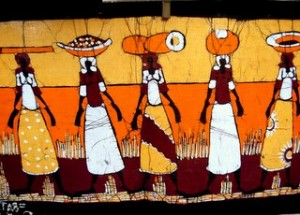
Motherhood, sisterhood, friendship.
In Paris, the Chilean researcher, novelist and feminist Ana (Nicha) Vazquez Bronfman had died, aged 71. She was a beacon for a generation of Latin American women for her insights on identity and gender. One concept she elaborated specially was “transculturation” – the permanent construction of identities in this world of global migration. In 2006 she wrote superbly about sexuality among the elderly – transgressions and secrets, she called it.
In Rome, my friend and fellow journalist Paola Rolletta underwent the next to last chemotherapy session against breast cancer. She was jubilant to see the end of the chemical bombardment. Like antiretrovirals, chemo saves lives but is no picnic.
So, in three hours, youth, disease, health and death touched me. Motherhood and friendship. Joy and sorrow.
Email has made this vertigo possible. News travel quickly and straight to our screens, to our hearts and minds.
News from friends
These days, breast cancer appears more frequently in news from friends.
One in the Dominican Republic and another in Mozambique finished their chemo last year. Paola is finishing hers in February. In Pretoria, where I live, another friend had her second chemo last Friday.
We had lunch together today and wondered if there is more breast cancer among women now than 50 years ago, or better detection. If the rates are higher, why? Lifestyle, fast food, stress, radiation from microwaves, cellphones and all the gadgets that crowd our life?
The Harvard School of Public Health estimates that the poor will account for more than 55 percent of breast cancer deaths this year. Read a very informative story on growing cancer rates among women in the developing world here.
A recent article in the New England Journal of Medicine argues that “western” influences such as changes in diet, less exercise, delayed childbirth, families with fewer children, less breast feeding, and hormone replacement therapy are all thought to increase the risk of breast cancer for women in low-income countries.
The good news is that breast cancer, like AIDS, is becoming less and less lethal, if detected and treated early.
I am so proud of my cancer-survivor friends. They have worn their baldness as a badge of courage and have acquired new wisdom.
And while we age and think about breast cancer, a younger generation moves closer to adulthood.
I wondered how to name and save this rambling text in my laptop. And I wrote – BLOG: LIFE.
]]>I will call her Gabra (gift, in Amharic), for our conversation was private. I met her at a monastery near Lalibela, the mystical city of [...]]]>
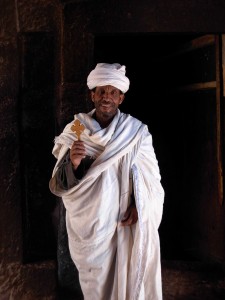
Patriarchal in all senses. By M. Sayagues
What drives a 17-year-old girl to enter a monastery? Today she is 30, and still happy about her choice. Her eyes sparkle and her laughter comes easy. She exudes peace.
I will call her Gabra (gift, in Amharic), for our conversation was private. I met her at a monastery near Lalibela, the mystical city of rock-hewn churches in northern Ethiopia.
Monastic life has a long tradition and prestige in the Ethiopian Orthodox Church. The oldest monastery dates from the 6th century. A monastic renaissance between the 13th and 16th century brought great moral and political authority to clergy.

Custodians of tradition
Gabra’s rock-hewn monastery dates from the 12th century. Her room is excavated in the pink tufa rock. Two built-in-the-rock platforms, covered with a thin mattress, do as couch and bed. An old cupboard holds a few plates and cooking utensils, three of the long green robes worn by Ethiopian peasants, the white headscarves that nuns wear, and two pairs of sandals.
For income, she and her fellow nuns weave cotton and silk into diaphanous shawls, sold at the monastery. She rises before dawn to pray – the first of daily seven prayers. Her ambition is to study theology in Addis Ababa or in Lalibela.
Gabra is not completely cut off from the world. She has a cellphone and a radio. On Sundays, relatives and friends visit.
Choices
I ask her if marriage and children ever interested her.
“It is a privilege to be single and not to have children,” she says softly, smiling but firmly. She sounds relieved.
Unmarried myself, I agree that motherhood and marriage are just one option. I understand the spiritual call, the peace of contemplation and withdrawal, of a simple lifestyle unencumbered by material things.
Yet I wonder if female genital mutilation had to do with her decision.
In Ethiopia’s eastern region, a girl might suffer genital cutting between the age of 15-17, before marriage. Her clitoris would be cut, sometimes the labia.
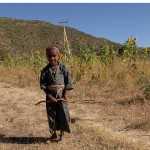
She has a right to her bodily integrity.
In Somali region, she would have infibulation at a younger age: the complete removal of her genitalia and, to preserve virginity, being stitched shut with an acacia thorn, leaving only a hole to urinate.
About three-quarters of women in Ethiopia between 15-49 have suffered some form of genital mutilation, said a government survey of 2005. The practice is fading – but too slowly, say activists.
It is not called mutilation for nothing. Sex and childbirth will be extremely painful and dangerous.
If finding a husband means suffering genital cutting, a hard mattress in a rock-hewn room is a much better place than a king-size wedding bed.
Gabra did not speak English, my male guide spoke little, and sex topics are taboo in Ethiopia, so the conversation went in another direction. Gabra was curious about my life, my work, and my daughter. 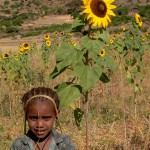
“Would you want to live like me?” she asked. “I don’t think I could,” I said. “But I feel the beauty of this simplicity.” She smiled.
Ethiopia looks and feels ancient and spiritual. Social cohesion is remarkable. But the same lifestyle that makes ferenji (foreigner, in Amharic) wax lyrical about the “biblical landscape and people” binds women to painful and dangerous traditions.
Some traditions are simply annoying. Women cannot join the rites if they are menstruating, ergo unclean. At no time of the month can women, local or foreign, enter the most sacred chapel of the Lalibela complex, Bete Mikael, where King Lalibela is buried. We are only allowed a glimpse from the door. In some monasteries, no females, including of the animal kingdom, are allowed.
Monastery visitors take leave at 5 PM (international time; in Ethiopian time, 11 in the night). I make my way down the stony path, the tufa rock glowing pink and gold in the sunset.
I am thinking that the monastery – the spiritual world – may be a blessed refuge from the hardship of being born female in a deeply patriarchal world.
Read recent IPS stories about genital cutting in Uganda, Sierra Leone and cross-border in West Africa.
]]>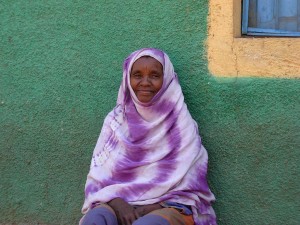
Women manage family health in Ethiopia.
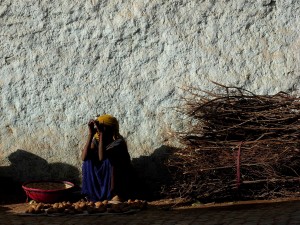
Pics by M. Sayagues
Burqa-wearing women may lose the right to drive in Bahrain over a conflict between government and conservative lawmakers.
The government wants to amend the traffic law and grant male traffic officers the right to ask women to lift the veil and show their faces.
On the other [...]]]>
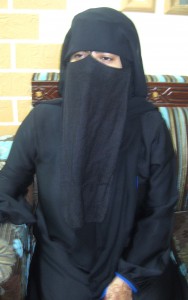
Dressed to drive? By S.Hamada
Burqa-wearing women may lose the right to drive in Bahrain over a conflict between government and conservative lawmakers.
The government wants to amend the traffic law and grant male traffic officers the right to ask women to lift the veil and show their faces.
On the other hand, some lawmakers are loath to approve the amendment or at least demand that female traffic officers be employed for this task.
Let’s hope that in either way it will be a win-win situation for women: that they will continue to drive, and enter a job sector that has been reserved for men since the 1970s. Bahrain doesn’t impose a dress code on women. Wearing a burqa (or Niqab, in Bahrain) is a personal choice.
OK, not all women here wear a burqa as personal choice; some do it to obey their male relatives or conservative families. Whatever the reasons, burqa limits women’s social and professional activities. For example, they cannot eat at restaurants without closed cabins nor work in many sectors except those with limited, female-only jobs.
Anyway, women who feel comfortable wearing a burqa shouldn’t be discriminated or underestimated. Females worldwide should be allowed to speak their minds, lead their lives to the fullest and freely practice their faiths.
Forcing women to take off their burqa is as cruel as forcing the veil on them.
A measure of independence
Burqa-wearing women in Bahrain have one important right – they can drive.
This is fairly new. Before 2006, burqa-wearing women drivers were harassed by traffic officers and fined.
In 2006 the government allowed burqa-clad drivers as a result of pressure from conservative MPs, who represent the majority of the Lower House, with the proviso that these women should, if requested, show their faces to traffic officers, for security reasons.
Not all were pleased with that decision. A Bahraini columnist, Abdullah Al Ayobi, argues that, for security reasons, fully covered women should not drive. He wrote last year that Bahrain was the only country in the world that allows unidentified individuals to drive.
Being able to drive has made life easier for women, especially with Bahrain’s poor public transportation.
We will soon know whether burqa-wearing women will continue to drive legally in Bahrain.
]]>Seven PM at the supermarket. After a long day at the office, she is standing in line to pay for groceries to make dinner, stealing glances at her watch, grappling with two young kids who want her to buy some chewing gum…
Does this picture ring a bell? Survey [...]]]>
Seven PM at the supermarket. After a long day at the office, she is standing in line to pay for groceries to make dinner, stealing glances at her watch, grappling with two young kids who want her to buy some chewing gum…

Unequal sharing of the work pie. M. Sayagues
Does this picture ring a bell? Survey after survey across the world report that women put in between 20 and 30 hours a week of domestic and family work. Unseen, unsung and unpaid, yes, but not insignificant.
Unpaid work in the home, done mainly by women, is estimated at approximately 50 percent of all productive activity even in industrial countries, and as much as 60-70 percent in many developing countries,” says Hazel Henderson in an interview with IPS.
“The U.N. Human Development Report and its Human Development Index (HDI) in 1996 calculated that unpaid work was estimated at 16 trillion dollars (11 trillion dollars by women and 5 trillion dollars by men). This figure was simply missing from the official global GDP figure of 24 trillion dollars, although a truer figure would have been 40 trillion dollars for global GDP in 1996.”
Henderson – futurist, economic iconoclast, founder of Ethical Markets Media and author - was commenting on the just published “Stiglitz-Sen Report”, which argues that countries need to find ways to measure well-being alongside raw economic growth.
Having dedicated her studies to an interdisciplinary economic and political theory focused on environmental and social issues, her views couldn’t be more pertinent.
(Find Henderson’s books)
]]>The UN has finally decided to stand up for women! A decision to create a new agency for women was taken by the General Assembly on September14.
Our colleague Thalif Deen, IPS bureau chief in New York, was the first and only journalist to report it for the [...]]]>
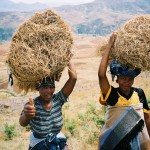
A breakthrough for us as well? M. Sayagues
The UN has finally decided to stand up for women! A decision to create a new agency for women was taken by the General Assembly on September14.
Our colleague Thalif Deen, IPS bureau chief in New York, was the first and only journalist to report it for the first several hours.
But this blog is not to crow about our scoop.
I’m quite excited by the prospect of a new women’s agency with money and political power. No longer will the world’s feminists have to lobby from the outside to put their views on the table. They have now won admission to the high table.
Any one of those bright, articulate, activist women can emerge to lead the agency. The reality is likely to be less rosy. But chances are that, because it’s new, it will be less under the thumb of the old boy network.
You think I’m a romantic? What the hell, there is no harm in dreaming, is there? I like to think that there was no way that the General Assembly could have once again shelved the plan for a new women’s agency.
It’s 14 years since Beijing. All the small and big things that governments were forced to accept around women’s rights (CEDAW, MDG, etc.) made it impossible for any country to block the efforts of myriad initiatives (from small grassroots groups to reforms in government policies even if they started as mere tokenism) and to politicise the cause of gender equality.
I do see great hope in the increasing presence of women in politics – Liberia, Japan, India, wherever you look, even Iran (new ministers) and the Gulf (Saudi Arabia has made a few small concessions to women!).
Of course, there is a backlash too – more violence against women worldwide.
As IPS gender editor, I am sure we will keep track of the new agency as it will be a key player achieving the MDG3 goal – gender equality.
Well, hope springs eternal!
]]>Instead of striking a balance between ambition and realism, the MDGs have become [...]]]>
Instead of striking a balance between ambition and realism, the MDGs have become “money-metric and donor-centric”, “meaningless catch-all phrases.”
So says Jan Vandemoortele, a Belgian national, a United Nations senior official and one of the architects of the MDGs, in a thought-provoking article in the July issue of Development Policy Review of the Overseas Development Institute. (read it here)
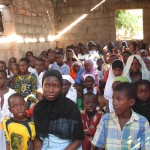
Unrealistic goal? A crowded classroom in Guinea Bissau...
The author recalls that the MDGs were set up in 2000 as collective targets based on extrapolations of global trends. They are vague by definition; they are not one-size-fits-all.
Instead, one should look at countries’ historical backgrounds, natural endowments and specific problems, then adapt the Goals to each circumstance, as Mozambique, Cambodia and Ethiopia have done.
Otherwise, this puts undue pressure on the poorest countries and, given that most of these are in Africa, nurtures Afro-pessimism.
For example, the global target for education “is not realistic” for countries in conflict, he says.
True, targets do change. For example, water for all in 2015 morphed into the more feasible goal of halving the number of people without clean water.
Magic numbers
A mantra has evolved: if only there were more money and higher economic growth, the MDGs would be achieved. Who is fond of these “magic numbers”? Staff at global headquarters of aid organisations, says the author, because of their “excessive reliance on abstract concepts.” (he should know, with his long career as a top UN official).
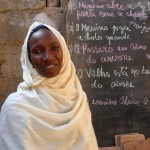
..and their teacher. By M. Sayagues
Vandemoortele sees the MDG canon being usurped by interest groups to push their agendas or devalued “as a repackaged call for more foreign aid.”
Rather, the MDG should be a tool to examine disparities and inequities within countries. In his view, the poorest people continue to be excluded. Many of these are women. Without better sex-disaggregated data, the gender dimension of hunger, illiteracy, disease and poverty remains unexposed.
Most progress takes place among the better off, and inequality and inequity keep rising, says the author.
“The targets are often presented as a universal good that will not demand tough policy choices and hard trade-offs among social groups within a country,” he says.
The MDGs should usher in new thinking about inequalities if they are not to miss the point
What do you think? Send us your views.
]]>I just attended the Grassroots Women’s International Academy on Home Based Care in Johannesburg, South Africa.
It was a mixed bag of fun meeting women from all walks and works of life from Kenya, Cameroon, Uganda, Malawi, Nigeria, Ethiopia, Rwanda, Zambia, [...]]]>
I just attended the Grassroots Women’s International Academy on Home Based Care in Johannesburg, South Africa.
It was a mixed bag of fun meeting women from all walks and works of life from Kenya, Cameroon, Uganda, Malawi, Nigeria, Ethiopia, Rwanda, Zambia, Ghana, Namibia, Zimbabwe, and South Africa.
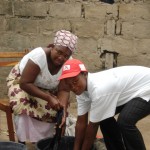
Caregiving in Mozambique. Photo: Janine Morna
The Huairou Commission and the Land Access Movement of South Africa brought us together to share experiences of home-based care.
It is fascinating how in Malawi the care givers alliance has moved forward. Victoria Kalomba, of the Malawi Group of Women Living with HIV and AIDS told us that the ministry of health and social development had spearheaded a campaign to raise awareness about people infected and affected by HIV.
The process had the ministry informing the support groups of individuals who had tested positive after visiting clinics so they could be reached and helped.
I am worried about this way of outing positive people even in the aim of mobilizing support groups. I feel that it is a human right violation to have to give information of someone’s HIV status.
Victoria was less worried. She said that the government has passed a policy that makes any name calling of people living with HIV a criminal offence. Okay.
Yet there is always stigma, just like one hears sexist and racist comments daily. Just because it is punishable has not stopped people from abusing or victimizing others. So I am wary of this and rather uncomfortable.
Next move
For caregivers, the issues are:
· remuneration,
· training and recognition of care givers as professionals,
· logistic and material support,
· psycho-social support to care givers and
· gender equality, and encouraging men to participate in care giving
Our next move is to lobby governments to recognize care work as a profession.
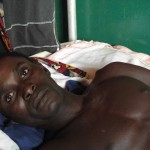
Carers ease the burden of disease. Photo: M. Sayagues
My sense is that there is a need for an alliance to assist in forming one body to represent caregivers. Most women caregivers said they felt disrespected, as they are not recognised for all their care work in health. No thanks are coming their way. They are very sore and disheartened at this lack of recognition. To move forwards, they require a voice to represent them.
One caregiver from Ethiopia said: “I will be taking so much home! I have realised that there are other countries struggling with lack of government support in the area of care work. We hope to continue to be in touch, especially on the issue of the alliance”.
To be able to laugh, as we share these issues, gives one hope. It is a strategy that I feel will take these unsung heroes to greater heights and at some point their voices will be heard.
As we said farewell, I felt a strong bond of sharing experiences and a need to continue the network.
I am sure I will meet most of these passionate women at this week’s SADC Heads of State Summit in Kinshasa, Democratic Republic of Congo, where today GEMSA is launching its report “Making Care Work Count – A Policy Analysis.”
The study covers Botswana, Democratic Republic of Congo, Lesotho, Malawi, Mauritius, Mozambique, Namibia, South Africa, Swaziland, Tanzania, Zambia and Zimbabwe.
GEMSA will strategize with civil society partners to lobby around care work in these countries.
]]>